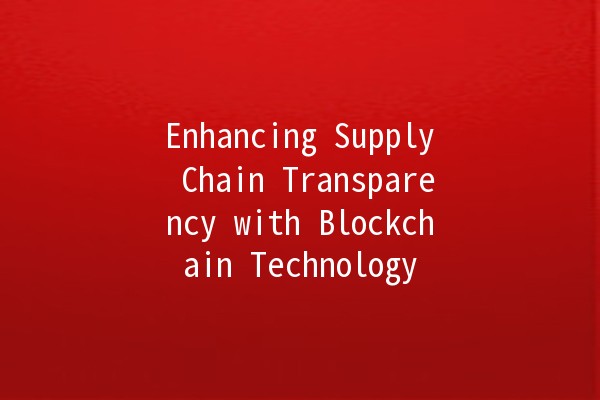
In today’s interconnected world, supply chains are becoming increasingly complex, requiring innovative solutions to enhance transparency and efficiency. One groundbreaking technology making waves in this arena is blockchain. By creating a decentralized, immutable ledger, blockchain technology has the potential to revolutionize how goods are tracked and verified throughout their journey from producer to consumer. This article delves into how blockchain can elevate supply chain transparency, offering practical insights and actionable tips for implementation.
The Importance of Supply Chain Transparency
Supply chain transparency refers to the visibility and traceability of products throughout the supply chain. It encompasses understanding where products come from, how they are made, and their journey to the consumer. This concept is crucial for several reasons:

Given this backdrop, blockchain emerges as a particularly fit solution to bolster supply chain transparency.
How Blockchain Works in Supply Chains
Blockchain technology employs a decentralized network where transactions are recorded in real time on a public or private ledger. Each block contains transaction data, a timestamp, and a cryptographic hash of the previous block, forming a chain that is immutable and secure. Here are the core features contributing to supply chain transparency:
Decentralization: No single party has control over the entire system, reducing the risk of data manipulation.
Immutability: Once recorded, transactions cannot be altered, ensuring authenticity and reliability.
Traceability: Every action taken can be traced back to its origin, providing a clear audit trail.
Specific Techniques to Enhance Productivity Using Blockchain
To harness the full potential of blockchain in supply chains, here are five specific techniques that can boost productivity and transparency:
Explanation: Smart contracts are selfexecuting contracts with the terms of the agreement directly written into lines of code on the blockchain.
Application Example: A food manufacturer can use smart contracts to automatically release payments to suppliers once the delivery of goods is confirmed via the blockchain. This automation minimizes delays and disputes, increasing operational efficiency.
Explanation: Blockchain allows for realtime tracking of products from source to consumer.
Application Example: A clothing retailer can utilize blockchain to provide customers with detailed information about the journey of their product, from the cotton field to the store. By scanning a QR code on the product, customers can see a transparent history, which builds trust and supports ethical practices.
Explanation: Blockchain provides a tamperproof record of all transactions and processes within the supply chain.
Application Example: A pharmaceutical company can streamline audits by relying on the blockchain to verify compliance with regulations. Auditors can access realtime data on production and distribution without extensive manual reconciliation of records.
Explanation: Blockchain facilitates easier, secure communication among all parties in the supply chain, from manufacturers to retailers.
Application Example: Automotive industry stakeholders can use blockchain to share data regarding parts sourcing and assembly processes. This collaboration can lead to reduced lead times and optimized inventory management.
Explanation: Blockchain’s encryption and decentralized nature protect sensitive data from breaches and unauthorized alterations.
Application Example: Food and beverage companies can leverage blockchain to secure data on supplier certification and compliance with safety standards. This enhanced security ensures that only verified data is available, mitigating the risk of fraud.
FAQ Section
Blockchain technology offers several key benefits in supply chains, including enhanced transparency, improved traceability, cost reduction, higher efficiency, and increased collaboration among stakeholders. By providing a secure and immutable ledger, organizations can streamline operations and build trust with consumers.
Blockchain improves product traceability by creating a transparent, timestamped record of every transaction within the supply chain. Each actor can access product data, verifying where it originated, how it has been handled, and when it reached its final destination. This detailed tracing can quickly identify issues such as recalls or fraud.
Most industries can benefit from blockchain technology in supply chain management, including food and beverage, pharmaceuticals, fashion, electronics, automotive, and logistics. Each sector can leverage blockchain to improve transparency, compliance, and operational efficiency.
Yes, while the benefits are substantial, there are challenges to implementing blockchain in supply chains, such as the need for significant investment in technology, integration with existing systems, training staff, and upholding regulatory standards. Addressing these challenges is essential for successful implementation.
Companies looking to incorporate blockchain should begin by identifying specific supply chain issues they wish to address. They can then engage with blockchain providers to develop a custom solution, starting with pilot projects to evaluate effectiveness. Collaboration among stakeholders is critical for success.
The future of blockchain in supply chain management looks promising, with increasing adoption rates and advancements in technology. As companies prioritize transparency and efficiency, blockchain is likely to integrate with IoT, AI, and other technologies to create smarter and more resilient supply chains.
In
Blockchain technology stands at the forefront of a new era in supply chain management, offering unparalleled transparency, efficiency, and security. By leveraging its unique features, companies can enhance their operational productivity and build trust with consumers. From implementing smart contracts to securing data integrity, the applications of blockchain are vast. As industries evolve and become more interconnected, blockchain will undoubtedly play a critical role in shaping the future of supply chains.
As more organizations recognize the value of transparent supply chains, the adoption of blockchain technology will likely accelerate, leading to greater accountability and sustainability across industries. Embracing this change is not merely a competitive advantage — it is becoming a necessity in our rapidly changing market landscape.

